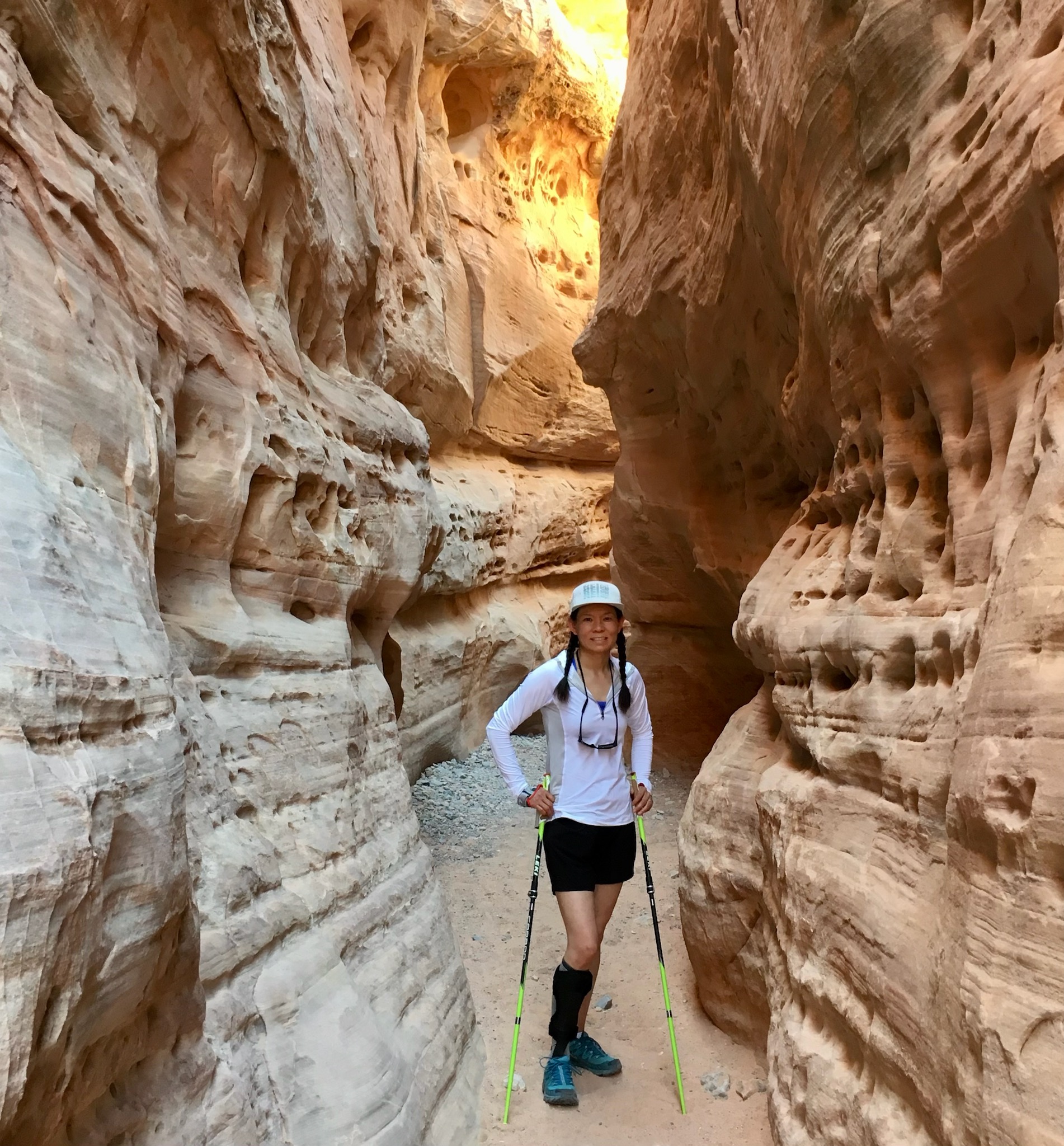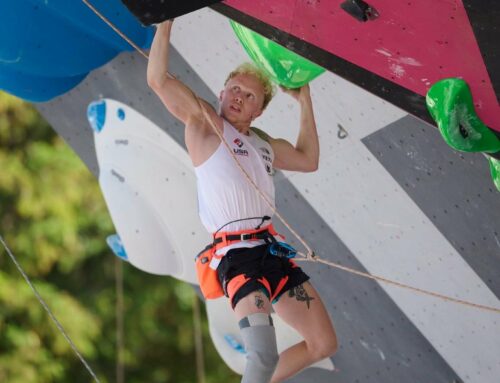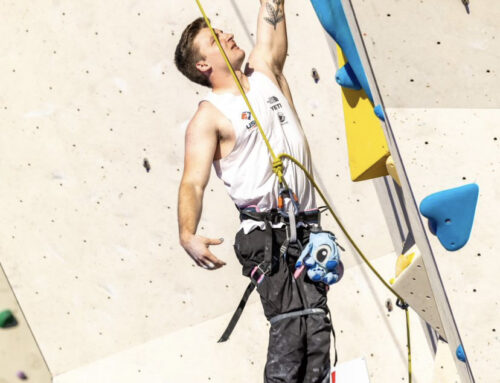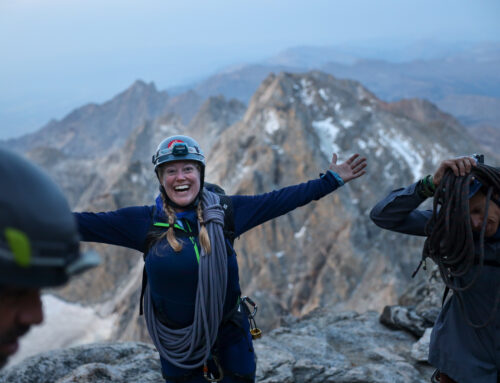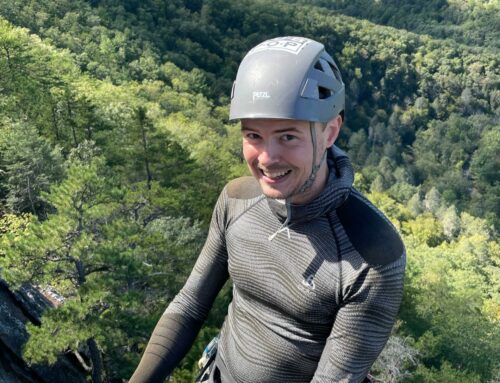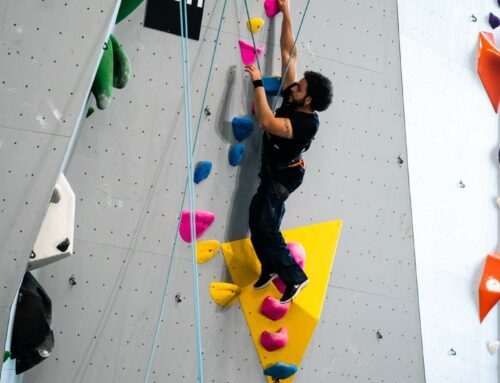Meet Paradox Sports Ambassador, Aika Yoshida!
Tell us about yourself: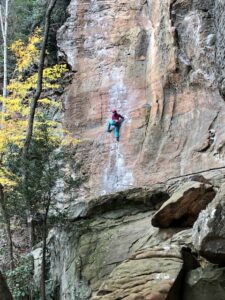
My name is Aika Yoshida. I was born in Japan. Since I was little I’ve been going back and forth between living in Japan and the United States. I’ve been a rock climber for about 20 years. I was a climber prior to my accident in 2013. It wasn’t a climbing accident. It was an acrobatic injury. I was dropped on my head while practicing acro yoga and injured my neck and sustained an incomplete spinal cord injury. I was very active before the accident, and interested in physical activities and physical movement, especially outdoor activities. My favorite thing is to be connected to nature. I have been fortunate to build upon my passion for movement and major in Exercise Science for my undergraduate degree.
I live in Indiana. It’s very flat land with lots of cornfields. It’s not very exciting but luckily we’re only about 4 hours away from the Red River Gorge in Kentucky, so that is our home crag. We go there pretty often.
What got you involved with Paradox Sports?
I was still in the hospital right after the accident. Some of my climbing friends sent me a Facebook post that Paradox Sports was going to be at the Red River Gorge for Rocktoberfest. They came to me and said “Hey, this is happening in case you’re interested.” At that time I was still in the hospital but read through it and thought “Hmm, that sounds interesting, maybe I should check it out and if I can make it that would be great.” So that’s how I ended up attending my first event with Paradox at Red River Gorge and surprisingly I was able to get on the wall. It was a wonderful experience, I met a lot of like-minded people and that was really beneficial for my healing journey. So that was the first Paradox event that I attended. Later in the winter, I attended the first Ouray Ice climbing trip.
What keeps you coming back?
I have a great appreciation for what Paradox Sports does and that really helped with my recovery, especially the mental part of it. I would like to be able to share what I experienced with other people so that more people can benefit from Paradox.
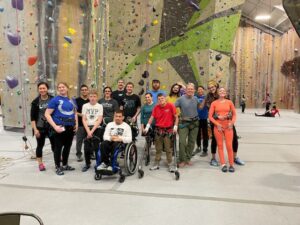 Where do you hope to see adaptive climbing go in the next few years?
Where do you hope to see adaptive climbing go in the next few years?
I was competing up until Covid hit, I would like for Paraclimbing to become a Paralympic sport eventually. I think that would be a really exciting thing for our community. At the local level, I would like to see more adaptive climbing groups at different climbing gyms.
We started our group, Indy Adaptive, 6 years ago and we’ve been running regularly, monthly. I think we are the only adaptive climbing group in Indiana. I would like to see more groups like that so that climbing can become more accessible to everybody and become the norm for all climbing gyms. I feel like there are a lot of needs and people can benefit from it and we just need to take more initiative. You know, if you want it you just have to start it. That’s how I got our group started. I wanted my community here too, so selfishly I thought maybe I will start my own, and it ended up being such a great group. I wanted to find a great community. I already had a lot of wonderful climbing friends because I’ve been a climber for so many years, but I also wanted a community like what Paradox provided, to have friends with different disabilities or limitations.
Do you have ideas or resources for someone who is looking into getting involved with adaptive climbing?
I think attending a Paradox event would be a wonderful way to get started. Maybe contact their local climbing gym to see if they would be able to help individuals if they don’t have a group started. There are also other adaptive climbing organizations and the Adaptive Climber’s Festival that people can check out.
Do you have any tips for starting your own adaptive climbing meetups?
Having great support from your climbing gym, that’s a huge thing. And a great group of volunteers. A lot of our volunteers are avid climbers and I think that is a great way to get the group started and having volunteers share their passion for climbing is huge. We do have some non-climbers as well who started to volunteer, but I think being a climber and helping other climbers is a great way to run the group.
We did a lot of fundraising to make sure we were able to bring Paradox Sports, so that was good because in order to do the fundraising it really got the community involved before we even started the group so a lot of people were aware of what we were trying to do. Our climbing gym, Epic Climbing and Fitness, has also been very supportive. We have 3 gyms (including 1 bouldering gym) in Indianapolis, but I actually drive by all 3 of them to get to Epic because Epic has been such a huge support and a great climbing community. So I would love to see more climbing gyms in general be more welcoming and inclusive. It’s always helpful to have even a few people that are so psyched about running/hosting an adaptive climbing session so that when a program starts it doesn’t disappear after a few months. It can continue and grow.
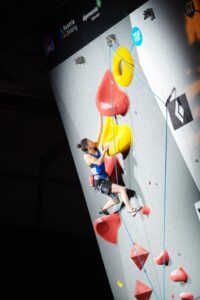 Are you involved with any other organizations?
Are you involved with any other organizations?
Nope! That’s where I kind of got connected with climbing again after my accident because I’m fairly mobile, even with my physical disability. So I didn’t feel like I really fit in with something like wheelchair basketball or that kind of activity. But I also can’t run, so I didn’t really have a place to fit in as an athlete and rock climbing was still a perfect fit for me.
Do you have any upcoming climbing goals or trips planned?
I will be at the Adaptive Climber’s Festival, so I’m excited about that. Nothing really specific for climbing goals, but something indirectly that will help my long-term goals is that I am training my dog, Maple, to be a service dog to help with my mobility. I do pretty well with climbing and being on the wall but I struggle with getting to crags. That is my biggest crux that people may not think of when they think of adaptive climbing. I would like Maple to help me with getting to climbing areas easier and start carrying more gear myself and hopefully saving some energy so that when I get to the crag I have more energy for actual climbing.
Since Covid hit, everything kind of paused for competition climbing for me. Since I’m a Japanese citizen, in order for me to compete I need to fly back to Japan to compete in the Japanese Nationals to make it to their team. I haven’t been home since Covid and now I’m considering retiring, but I haven’t made a final decision yet. I keep thinking I want to do one more comp! When I see comps on YouTube, I realize how much I miss being there. I really enjoy the community and the comp atmosphere, but the training, I’m not sure if I can continue to endure vigorous training to be a competitive athlete.
The Japanese adaptive climbing scene is growing. Originally, Japanese paraclimbing heavily focused on blind climbers because of the support of a blind competitive climber named Koba. He actually started an organization in Japan to grow an inclusive climbing community for people with and without disabilities called Monkey Magic. Now the community is growing, and we are starting to see more Japanese athletes in different categories so that has been really exciting for me to see.
(*Competition Photo taken by Sytse van Slooten)
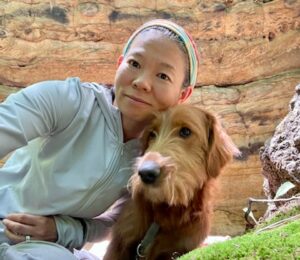 Anything else you would like to share about yourself!
Anything else you would like to share about yourself!
I think the biggest thing is what we touched on a little bit earlier. Just because adaptive climbers can climb doesn’t mean that we don’t struggle to get to climbing areas. I think people see me like “Oh why is she a paraclimber, she does fine on the wall.” I don’t need people to be sorry for me or anything, but I may need different accessibility or support to get to climbing areas that people may not think about. Especially because I have all four limbs, and I look completely “normal” if I’m just standing. If people see somebody with apparent physical disabilities they may have a little bit more understanding, but I think all adaptive climbers are so different and unique in a way with what we require on and off the wall. I don’t have to worry too much about falling on a rope (especially top roping) when I’m on the wall but getting to the crag I fall a lot and I need to use hiking poles and there are struggles that people may not always realize. Me being a physical therapist, I’m always thinking about why is climbing easier than hiking? But when you think about climbing, it’s almost like crawling. You’re just crawling, using 4 limbs against gravity. So if I’m crawling on the floor, I don’t fall but if I’m on two legs hiking it’s easier for me to fall. That’s how I see climbing, and that’s why I think it can make it easier for some people. It’s important for other people to be sensitive towards people’s needs and not make assumptions or quick judgments. I think that as an adaptive climber, I need to be more open to asking for help as well.


